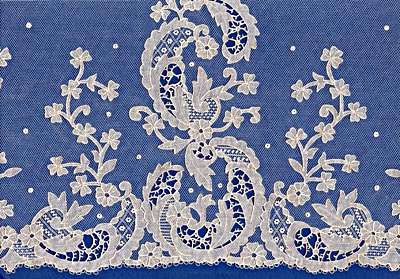Carrickmacross lace

Carrickmacross lace is a form of lace that may be described as decorated net. A three-layer 'sandwich' is made consisting of the pattern (at the bottom), covered with, first, machine-made net and then fine muslin, through which the pattern can be seen. A thick outlining thread is stitched down along the lines of the pattern, sewing net and fabric together. Loops of thread known as 'twirls' are also couched along the outer edge. The excess fabric is then cut away. Some of the net is then usually decorated further with needle-run stitches or small button-holed rings known as 'pops'. Occasionally bars of buttonhole stitches are worked over fabric and net before both are cut away.[1]

Carrickmacross lace was introduced into Ireland in about 1820 by Mrs Grey Porter of Donaghmoyne, who taught it to local women so that they could earn some extra money. The scheme was initially of limited success, and it was only after the 1846 potato famine, when a lace school was set up by the managers of the Bath and Shirley estates at Carrickmacross as a means of helping their starving tenants, that the lace became known and found sales.[2]
References
- ↑ "Decorated Nets". The Lace Guild. Retrieved 21 April 2013.
- ↑ Levey, Santina (1983). Lace: A History. London: Victoria and Albert Museum. p. 92. ISBN 090128615X.
